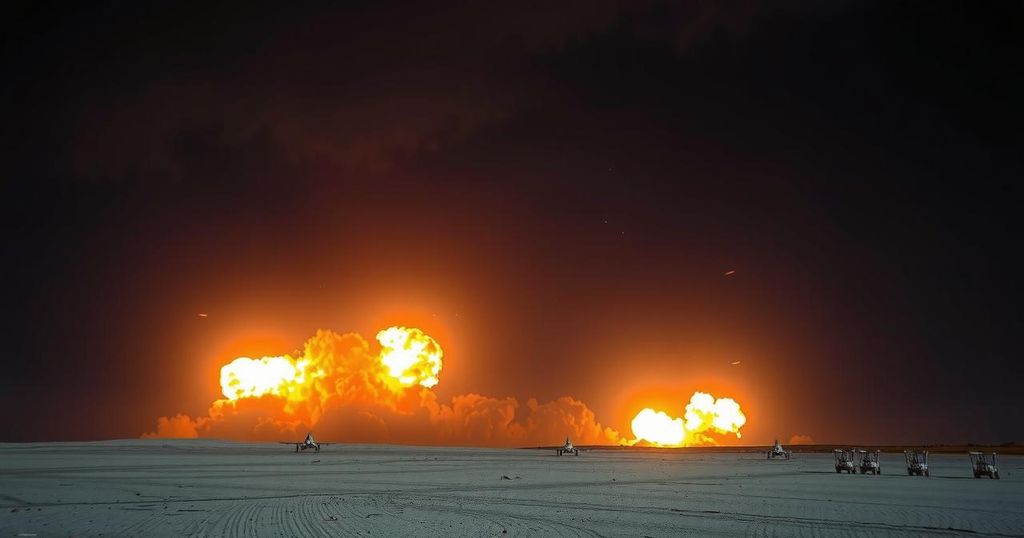Escalating Tensions: Impact of U.S. Airstrikes on Yemen and the Houthis

U.S. airstrikes in Yemen have resulted in at least 53 fatalities, escalating tensions with the Iran-aligned Houthis. These strikes are part of a campaign against Iranian influence amid ongoing negotiations surrounding its nuclear program. The Houthis have intensified maritime attacks as retaliation, claiming solidarity with Palestinians, while the U.S. and allies view them as threats to global trade. The dynamic includes complex regional interactions and warnings against further hostilities.
Recent U.S. airstrikes in Yemen, which have reportedly resulted in the deaths of at least 53 individuals as per the Houthi-run health ministry, have escalated tensions in the region. The casualties include five children and two women, while 98 others suffer injuries. The Houthis, who control significant portions of Yemen amidst ongoing Saudi-led attacks, have intensified their operations against maritime vessels since November 2023, jeopardizing international trade.
These strikes are part of a broader effort by Washington to exert sanctions on Iran and foster negotiations regarding its nuclear ambitions. Earlier, an Emirati official conveyed a letter from former President Trump advocating for nuclear discussions, which Iranian Supreme Leader Ayatollah Ali Khamenei dismissed as “deception.”
Iranian officials have stated they will take time to respond to the letter after thorough examination. The Houthis have framed their maritime assaults as acts of solidarity with Palestinians amid the conflict in Gaza, yet the U.S. and its allies view these actions as reckless and detrimental to global commerce.
Abdul Malik al-Houthi, the leader of the Houthis, asserted their commitment to targeting U.S. naval vessels as long as the U.S. continues military operations in Yemen. Under his leadership, the Houthis have evolved into a formidable force comprising tens of thousands and possessing advanced weaponry, which Saudi Arabia and Western nations allege are sourced from Iran, a claim that Tehran refutes.
While Iran supports the Houthis, the latter insist on their autonomy, driven primarily by regional concerns. On Monday, a military spokesperson from the Houthis claimed responsibility for a renewed strike against the U.S. aircraft carrier USS Harry S. Truman, further escalating tensions in the Red Sea.
The Houthis are integral to the so-called “Axis of Resistance,” an alliance opposed to Israel and the West, including groups such as Hamas and Hezbollah, with Iran offering support. Following Hamas’s attacks on Israel in October 2023, Israel has weakened several Iranian allies, but the Houthis remain resilient despite these challenges.
In a related incident, Israeli airstrikes resulted in the deaths of three Palestinians in Rafah, further complicating the ongoing crisis. These military operations are part of Israel’s broader campaign against what it terms terrorists following attacks from Hamas. The violence highlights the ongoing fragility of ceasefire attempts between Israel and Hamas, lacking momentum in negotiations to sustain peace.
The Houthis warned of renewed retaliation against Israeli maritime vessels unless Israel permits humanitarian assistance into Gaza, with their operations also including missile and drone assaults on Israel. Israel, having targeted multiple locations associated with the Houthis in Yemen, cautioned that the militants risk facing dire consequences similar to those experienced by Hamas and Hezbollah if they do not cease their hostilities. Former President Trump has issued a warning to Iran regarding its support for the Houthis.
The recent U.S. airstrikes on Yemen signify a pivotal moment in the ongoing conflict involving the Houthis and highlight the heightened tensions surrounding Iran’s influence in the region. The death toll from these attacks, including civilian casualties, underscores the humanitarian crisis unfolding in Yemen. Furthermore, the Houthis’ retaliatory threats against U.S. and Israeli interests reflect the complexities of Middle Eastern geopolitics, marked by alliances and hostilities that continue to destabilize the region. The current situation invites scrutiny of international efforts to mediate peace and underscores the urgent need for dialogue to prevent further escalation.
Original Source: m.economictimes.com








